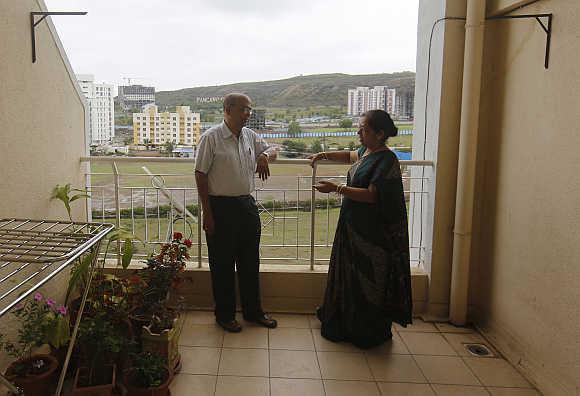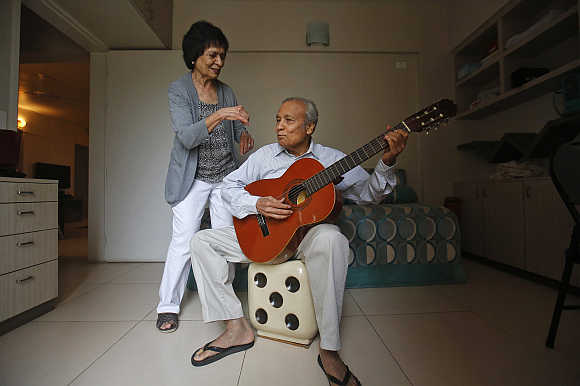Photographs: Danish Siddiqui /Reuters Shyamal Majumdar
The inability to deal with a post-retirement life may be more prevalent in cities like Mumbai and Delhi but is becoming common everywhere, notes Shyamal Majumdar.
Seven years after he retired as chief executive officer of a fairly large company, Mr X (who has requested anonymity) and his wife are shifting from Mumbai to a city he thought he had left for good over 40 years ago.
His children are settled abroad and the large house that was once the venue of many get-togethers of Mumbai's famous faces, is now adding to the emptiness of the couple's lives, so he has put it up for sale.
"I have now realised you can have only professional acquaintances in this city but no friends," he says during a chance meeting.
His wife has a few relatives in the city to which he is shifting.
"I know one of us will have to live alone. I want her to have at least some company when I am gone," the gentleman says.
The photograph is used for representational purpose only
. . .
How to deal with post-retirement blues
Image: An old woman walks past the plastic wrapped idols of Vishwakarma, the Hindu deity of architecture and machinery, kept on display for sale at a roadside in Kolkata.Photographs: Rupak De Chowdhuri/Reuters
As someone who met him frequently in his heyday, I found it difficult to come to terms with this despondence.
But it has nothing to do with Mumbai.
The inability to deal with a post-retirement life may be more prevalent in cities like Mumbai and Delhi but is becoming common everywhere.
Some have, of course, coped by not retiring at all -- even if that requires changing and re-changing the retirement age of directors or appointing an executive head who will retire much before his own extended term.
But these blessed souls are rare.
The notion that post-retirement blues is all about financial stability isn't entirely true. Money is not an issue for most of the people to which this column is referring.
The photograph is used for representational purpose only
. . .
How to deal with post-retirement blues
Image: A couple enjoys beach during summer.Photographs: Sergio Moraes/Reuters
Listen to this lady, who retired as principal of one of Mumbai's top colleges, and poured her heart out to a counsellor: "I retired a little over three years ago and feel as if I will never adjust.
“I wish I had a plan to keep myself busy."
The counsellor says the number of financially well-off people seeking emotional crutches after retirement is increasing rapidly.
It's ironic that most of them looked forward to retiring in the hope that it would free them from daily work obligations.
However, most never really planned for their big respite and soon grew bored, lost a sense of purpose and felt unwanted.
The recurring question they face when they go to bed every night is: What do I do after I wake up tomorrow?
The photograph is used for representational purpose only
. . .
How to deal with post-retirement blues
Image: An elderly women rests on her wheel chair.Photographs: Enrique Castro-Mendivil/Reuters
For most, this boredom comes not immediately after retirement but a few years later when they have finished touring places they hadn't visited earlier or meeting relatives they couldn't find time for during their hectic professional years.
So, how does one deal with this no-one-wants-me kind of a feeling after formal retirement?
One obvious solution is to work as long as you can -- but preferably not in the same company (even if the top management wants you) for three reasons.
One, your colleagues will always see you as unwanted competition who isn't allowing others to grow.
Two, you could end up feeling you are doing the same job over and over again.
The photograph is used for representational purpose only
. . .
How to deal with post-retirement blues
Image: Suresh Chitre, 67, and his wife Rekha Chitre, 63, stand on the balcony of their flat at the Athashri retirement village in Baner, on the outskirts of Pune.Photographs: Danish Siddiqui/Reuters
And three your organisation runs the risk of being crushed under the burden of one man or woman's indispensability.
But counsellors say regular work is the best solution.
Many people are already doing that in India and abroad. Recent research by Aviva showed that since 2010, the number of people working after retirement has soared.
In December 2010, less than one in five people aged 65 to 75 years received wages or other earned income.
By the end of 2012, the figure had climbed to 23 per cent.
There are examples galore to verify this data.
The photograph is used for representational purpose only
. . .
How to deal with post-retirement blues
Image: Aruna Gokhale, 81, watches as her husband Vidyadhar Gokhale, 84, plays guitar in their flat at the Athashri retirement village in Baner, on the outskirts of Pune.Photographs: Danish Siddiqui/Reuters
A former bank chairman is earning much more as a management consultant than his last-drawn salary at the bank, though he says he isn't doing it for money but to keep himself busy.
He could well be right since counsellors say for the majority of these affluent older men who are choosing to return to work after quitting their first careers, it's a lifestyle choice.
That's why a retired top executive in a multinational firm has gone in for a different vocation: directing stage productions, while yet another -- an engineer by profession -- has opened an image management firm.
Thankfully, there are other solutions and counsellors suggest options that include hitting the gym; meeting new people at your walking area; or thinking about things you really liked when you were younger.
Say, singing, painting, photography or even, perhaps, writing.
The photograph is used for representational purpose only
. . .
How to deal with post-retirement blues
Photographs: Reuters
You may want to take classes to enhance your skills.
There is also plenty of volunteer work as well and such jobs often promote a feeling of belonging and will give you a social life as well.
Or, remember the time you wanted to keep a pet but couldn't because of your hectic work hours?
But whatever you choose to do, craft a detailed plan and budget.
These may sound trivial, but as the counsellor says, try them out.
They might just give you a sense of purpose.
The photograph is used for representational purpose only
. . .








article